An Equity Framework for Competency-Based Education
CompetencyWorks Blog
This is the eleventh post in the blog series on the report, Quality and Equity by Design: Charting the Course for the Next Phase of Competency-Based Education.
An equitable educational system starts with a commitment to quality and excellence, is designed to personalize learning and embeds strong equity strategies into the core of the organization. This blog offers a framework for how states, districts and schools can develop an equity agenda within their competency-based systems.
The framework offers the following set of Equity Principles that can be use to create and embed equity strategies within personalized, competency-based systems.
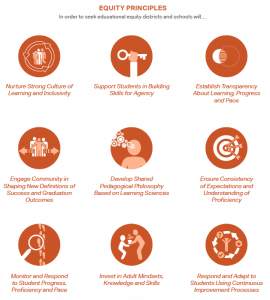
For each principle, we then offer reflection questions to generate discussion, guide reflection and trigger capacity building:
CULTURE
In what ways does the school culture promote a growth mindset, build trust and inclusivity?
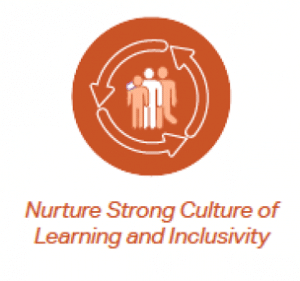
The culture of schools is designed so that all students and adults, especially the most marginalized, feel safe and respected and can build trusting relationships that enable direct and productive feedback. Adults regularly experience and share their own learning and model a growth mindset for students. Students unfamiliar with a school’s dominant culture may lack fluency in the social cues and language that educators use to interpret students’ readiness for learning. Acknowledging the existence of a dominant culture is important in order to open dialogue regarding student communication and engagement.
STUDENT AGENCY
In what ways are students coached in and have opportunities to practice and apply the lifelong skills they need to develop agency?
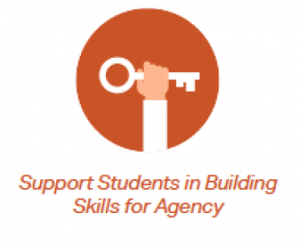
Schools provide feedback, coaching and opportunities for students to build the skills and mindsets needed to develop intrinsic motivation and become lifelong learners. Culture fosters an environment where students have multiple intentional opportunities to practice habits of success and social-emotional skills.
TRANSPARENCY
What systems, practices and routines are in place so that students understand their own learning path and how to advance? How do schools know and ensure all students are growing at a meaningful pace that guarantees they graduate prepared for college, career and life?
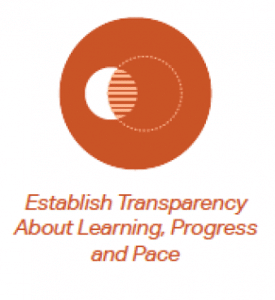
The cycle of learning is explicit and transparent so that students know what they need to learn, what proficiency looks like, how they will be assessed, and how they are progressing. Teachers work together to use data on student progress to respond to students and to inform their professional learning.
DEFINITIONS OF STUDENT SUCCESS
Has the school community developed a shared definition of student success? What are the expectations for the skills, knowledge and traits that students will need for lifelong learning and preparation for college and career? How is the school designed to help students build the necessary knowledge, skills and habits?
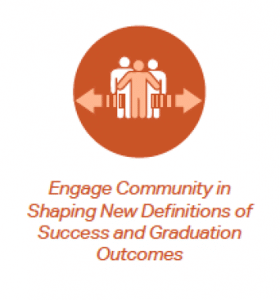 Districts and schools engage the community in creating a shared vision of what students need to know and be able to do upon graduation. Districts and schools are designed around a well-rounded set of competencies that students master upon graduation including academic knowledge and skills, lifelong learning, and higher order skills. The culture of learning ensures that definitions of student success (beyond college and career readiness) apply to all students and are internalized by adults and students.
Districts and schools engage the community in creating a shared vision of what students need to know and be able to do upon graduation. Districts and schools are designed around a well-rounded set of competencies that students master upon graduation including academic knowledge and skills, lifelong learning, and higher order skills. The culture of learning ensures that definitions of student success (beyond college and career readiness) apply to all students and are internalized by adults and students.
PEDAGOGICAL PHILOSOPHY
To what degree is there a shared understanding of effective instruction and assessment based on the learning sciences? In what way are teachers supported in differentiating and personalizing learning in order for students to reach common, rigorous educational outcomes and discover talents and interests?
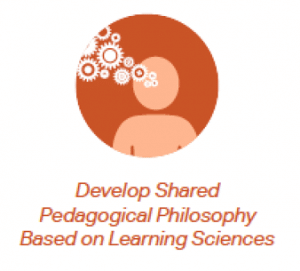 Districts and schools are designed around shared and explicit pedagogical philosophies based on research in engagement, motivation, child/youth development, neuroscience and learning sciences. Important pedagogical approaches to include are Universal Design for Learning, literacy across the curriculum, culturally responsive strategies and promoting student agency.
Districts and schools are designed around shared and explicit pedagogical philosophies based on research in engagement, motivation, child/youth development, neuroscience and learning sciences. Important pedagogical approaches to include are Universal Design for Learning, literacy across the curriculum, culturally responsive strategies and promoting student agency.
CONSISTENCY AND RELIABILITY
What types of processes are in place to support teachers in building a shared understanding of proficiency of academic skills, social emotional skills and habits of success? Is the process of determining proficiency calibrated, consistent and fair?
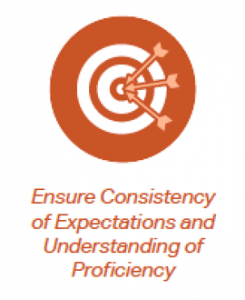 The expectations of the learning objectives and rigor are calibrated with all students being held to the same high standards, including demonstrating mastery and fluency in the foundational skills.
The expectations of the learning objectives and rigor are calibrated with all students being held to the same high standards, including demonstrating mastery and fluency in the foundational skills.
PACE AND PROGRESS
What process and strategies are used by districts and schools to measure and monitor student growth based on student performance levels? How does the school monitor and respond when student pace is slower than anticipated within the time-bound targets? What types of strategies are in place to reinforce a focus on learning and growth given the grade-level focus of state accountability systems?
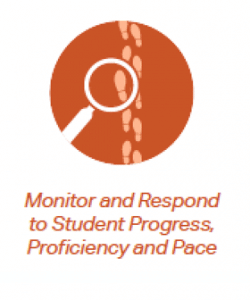 Individual student pace and progress are closely monitored, as are trends over time by individuals, groups and cohorts. Student progress is measured by growth along a learning continuum with personalized strategies for setting the pace of learning towards graduation. Supports are in place that ensure students reach proficiency and make progress.
Individual student pace and progress are closely monitored, as are trends over time by individuals, groups and cohorts. Student progress is measured by growth along a learning continuum with personalized strategies for setting the pace of learning towards graduation. Supports are in place that ensure students reach proficiency and make progress.
ADULT MINDSETS
In what ways are educators supported in their professional learning that is linked to student growth? How are adult beliefs and actions examined in an ongoing way that identifies bias and supports empathy, self-awareness and inclusivity?
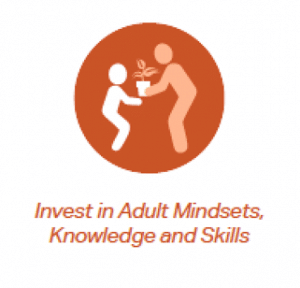 Leadership values and supports the ongoing growth of adults. Trust is actively nurtured. Structures provide ongoing opportunities for nurturing growth mindset and self-reflection. Deepening awareness and addressing bias are critical to ensure that adults have empathy for students and are open to multiple strategies for co-creating their learning paths. Teachers are supported in building their professional skills in the learning sciences, instructional strategies, knowledge of the domains, learning progressions and equity strategies including cultural responsiveness and Universal Design for Learning.
Leadership values and supports the ongoing growth of adults. Trust is actively nurtured. Structures provide ongoing opportunities for nurturing growth mindset and self-reflection. Deepening awareness and addressing bias are critical to ensure that adults have empathy for students and are open to multiple strategies for co-creating their learning paths. Teachers are supported in building their professional skills in the learning sciences, instructional strategies, knowledge of the domains, learning progressions and equity strategies including cultural responsiveness and Universal Design for Learning.
It is important to remember that most, if not all, equity issues and inequitable patterns are also problematic in the traditional system. The difference is that in competency-based districts and schools, these challenges become transparent and leaders and educators take responsibility for addressing them. Why? Because competency-based education seeks to embed accountability at all levels so that educators can meet students where they are and districts and schools operate as learning organizations that continue to adapt and improve.
Follow this blog series for more articles charting the course for the next phase of competency-based education, or download the full report:
- Quality and Equity by Design
- Readiness for College, Career and Life: The Purpose of K-12 Public Education Today
- Why A Competency-Based System Is Needed: 10 Ways the Traditional System Contributes to Inequity
- How Competency-Based Education Differs from the Traditional System of Education
- Competency-Based Education and Personalized Learning Go Hand-In-Hand
- Building Shared Understanding of Quality through Design Principles
- 5 Quality Design Principles for Culture
- 7 Quality Design Principles for Structure
- 4 Quality Design Principles for Teaching and Learning
- Designing a Competency-Based System for Equity
Learn more: